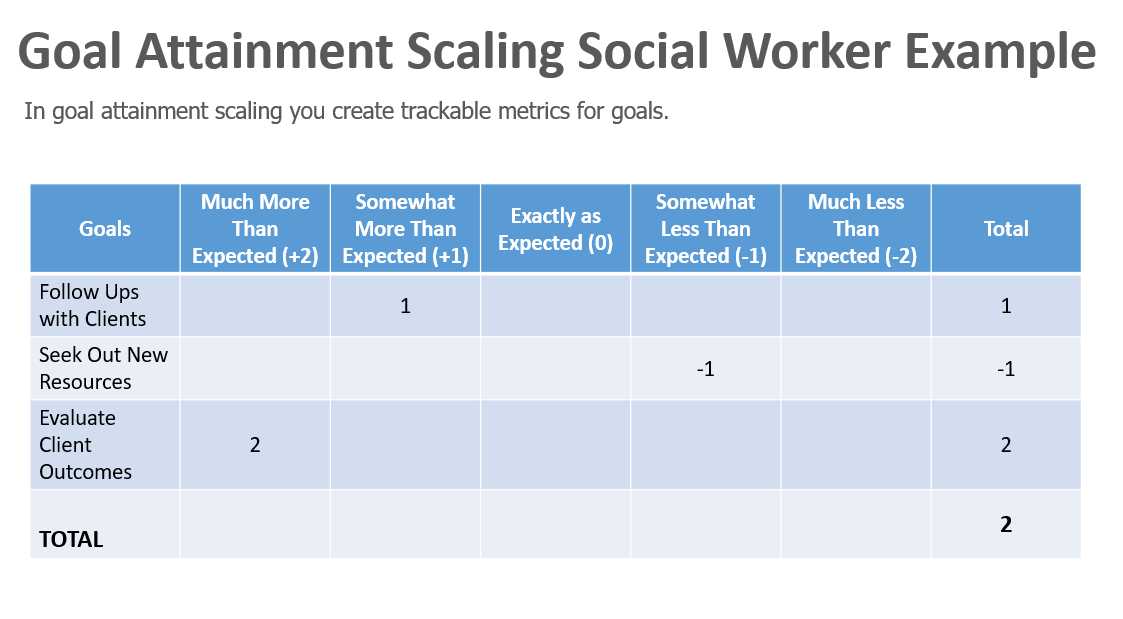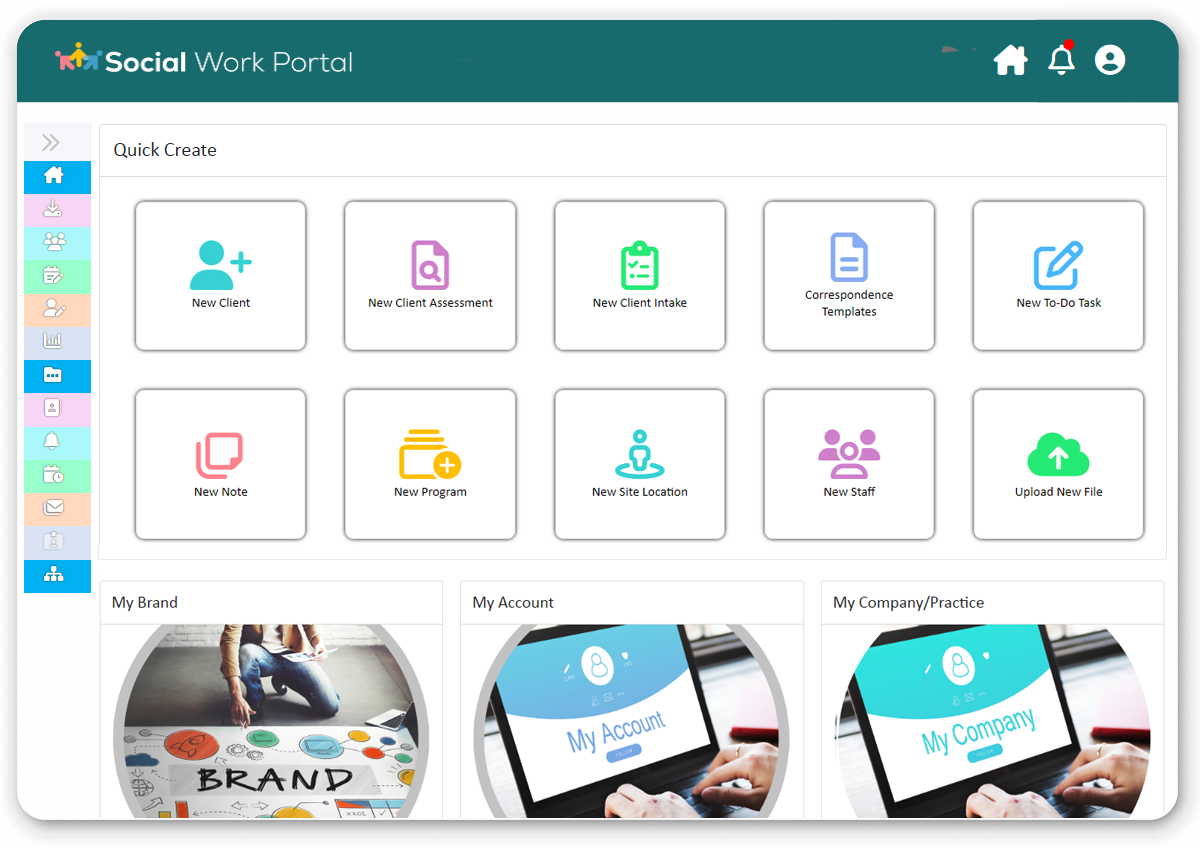The Different Types of Evaluation in Social Work Practice – Everything You Need to Know
The Best Tools and Methods of Evaluation in Social Work for All Social Workers in 2024
How do you know that a client intervention is working? When should you change tactics with a social program because it’s not having the desired impact?
Monitoring and evaluation in social work is a vital function. It enables you, as a social worker, to continually optimize care delivery and it helps social organizations and government agencies to improve programs, so they have the maximum positive impact.
There are different types of evaluation in social work that you need to know about, which are all reviewed in this guide. The different types of evaluation involve those at the individual level, at the social worker practice level, and the social work program level.

Social Work Performance Evaluation Examples
Evaluation tools in social work help ensure that methods of therapy and assistance evolve with each generation. Program evaluation for social workers can also help ensure funding for a necessary program by showing the benefits being provided.
In this article, we’ll review several social work performance evaluation examples, using different evaluation methods in social work. We start with answering the question, “What is evaluation in social work?” and then will cover these three evaluation levels:
- Client Evaluation
- Social Worker Practice Evaluation
- Social Work Program Evaluation

See Also: Job Aid to Help You Learn the Best Social Worker Case Notes Formats
Table of Contents
Keep on scrolling down this page to read each section, or click any link below to go directly to that section.
- What Is Evaluation in Social Work? What do You Really Need to Know?
- The True Importance of Evaluation in Social Work
- Overview: Evaluation Methods in Social Work
- Looking for Social Worker Tools to Standardize Social Work Evaluation & Assessment?
- Client Social Worker Evaluation & Examples
- Free Evaluation in Social Work PDF
- Evaluating Your Approach with Clients (Evaluation of Social Work Practices)
- Program Evaluation in Social Work (3rd Level of Evaluation in Social Work)
- Evaluation in Social Work PDF & PPT Downloadable Files
- Social Work Evaluation Tools Used by Social Workers
- Conclusion | Social Work Evaluations (Types & Methods)
- Types of Evaluation in Social Work Practice – Additional FAQs
Don’t Miss: What You Should Know About a Medical Records Release Authorization Form
Contact the Social Work Portal Team if you have any questions or feedback about this end-to-end evaluation in social work guide.
What Is Evaluation in Social Work? What do You Really Need to Know?
Social work relies on the delivery of various services to assist an individual, family, group, or community in need. The evaluation process in social work involves using quantitative and qualitative measurements to assess whether the services achieved the desired outcome.
In short, did the intervention help? Did it help in the way it was intended? Did a social work program provide the desired support to a community, or did it fall short?
Without evaluating social work interventions, social workers are in the dark about which types of services are successful, and which aren’t. Likewise, without social work program evaluation, the success or lack of success of a program may be based on subjective views of a few people with no real data to back up a conclusion.

Related: What Is an Authorization for Release of Health Information Pursuant to HIPAA?
The True Importance of Evaluation in Social Work
The evaluation social work practitioners conduct provides an important way for them to continually optimize what they do to make their service delivery more effective.
Social work evaluation is a critical tool for improving social work programs and strengthening the communities served through these social services.
On an individual level, psychosocial evaluation and social work self-evaluation examples help a care professional learn more about the needs of a patient or client so they can create more targeted care plans using social work and case management tools.
Evaluation of social work practice helps everyone, from the client to the social worker to the agency offering social programs by providing the information needed to optimize social work services.

Popular Article: Soap Progress Notes – Guide
Do you have any questions or feedback about social work evaluations or the evaluation tools in social work? If so, click here to contact the Social Work Portal Team.
Overview: Evaluation Methods in Social Work
As we noted above, we’ll be explaining methods of evaluation in social work for three different levels – client, social worker practice, and program.
Each of these social work evaluation types will have a slightly different purpose, but all are designed to improve care delivery to a client, group, or community.
Would you like multiple evaluation tools at your disposal to boost your practice effectiveness? Get started by joining Social Work & Client Assessment Platform.
Types of Evaluation in Social Work Practice:
- Client Evaluation Social Work Professionals Use
- Psychosocial Evaluation
- Social Work Self-Evaluation Examples
- Social Worker Practice Evaluation in Social Work
- Client Feedback
- Outcome Evaluation of Social Work
- Goal Attainment Scaling
- Program Evaluation in Social Work
- Formative Evaluation
- Process/Implementation Evaluation
- Outcome/Effectiveness Evaluation
- Impact Evaluation
- Summative Evaluation
Read More: Social Work Theory & Practices You Need to Know About
Client Social Worker Evaluation & Examples
Social work includes both social worker assessments and client evaluations. Both are important as they provide key information to a social worker that can inform a client’s care plan and whether any adjustments are needed to meet goals.
Here are two common client-based social work evaluation example overviews.
Psychosocial Evaluation
A psychosocial evaluation is performed on a patient and takes a holistic look at that person’s mental, physical, and emotional health. It also requires input from the patient, which gives the medical or social work professional insight into the patient’s perception of their own state of wellbeing and ability to function in the community.
A series of questions will be asked of the patient during this evaluation process in social work. These questions will be focused on learning what the client intends to get from their treatment, and how they feel they’re progressing.
The psychosocial evaluation will typically be given in situations such as:
- Someone that has demonstrated self-destructive behaviors
- Victims of war or violent crimes
- When someone is first admitted to a psychiatric or long-term care facility
Social Work Self-Evaluation Examples
One of the types of evaluation in social work that is helpful as a check-in with a client is a self-evaluation. This forces the client to take stock of how their care plan is progressing and provides valuable feedback for the social worker on the steps to be taken next.
Self-evaluation in social work practice can be done in the middle of the intervention to chart progress and as a precursor to the termination of a care plan to ensure the client is ready to continue their progress on their own.
If using a self-evaluation social work survey before the termination of a client engagement, you would want to ask questions such as these:
- Do you feel your social worker has met your expectations for your care plan?
- If not, what else do you feel would be of help to you?
- Do you feel confident you’ve progressed enough to conclude your care plan?
- What other social or clinical services do you anticipate needing after your work with the social worker is concluded?
- Do you feel confident that you know where to go for help if you should need it again?
- When do you feel your care plan with this social worker should end?
Free Evaluation in Social Work PDF
Download an evaluation in social work PDF that includes an overview of different social work evaluation methods.
Related: Why are Genograms Really Important for Social Workers?
Are there other social work self-evaluation examples you know if that would be of help to other social workers? If so, click here to contact the Social Work Portal Team.
Evaluating Your Approach with Clients (Evaluation of Social Work Practices)
Now, we’ll take a look at evaluating social work interventions. Social workers need to evaluate their approaches with clients to ensure they are achieving the desired results.
Practice evaluation in social work also helps social workers hone their craft as they learn the types of interactions that work for each of the different client situations and personality types they work with.
Here are three social work evaluations that help social workers stay on track and optimize their service delivery.
Client Feedback
One common social work evaluation example is client feedback. Did a client and their family feel the intervention was helpful? While this is a subjective method of monitoring and evaluation in social work, it’s still a valid one that will provide valuable insight.
If client feedback social work evaluations show a high percentage of unhappy clients or those that didn’t find the care plan helpful, this can indicate a need to change the approach being used.
 |
Looking to Boost Your Social Work Skills? Subscribe to All-in-One Case Management Hub and go to My Library! |
Outcome Evaluation of Social Work
A less subjective and more quantitative social worker evaluation would be based on outcome measurement. This involves putting milestones and goals in place for client interaction. Such as a client going for six months without returning to self-destructive behaviors.
Another measure that could be used for outcome evaluation of social work professionals’ practice is whether a client successfully transitioned to a new retirement home or another long-term care facility.
Outcome evaluation of social work will look directly at the results of the social worker engagement and measure whether or not that met expectations.
Goal Attainment Scaling
Goal attainment scaling (GAS) can be used both for client progress evaluation and social worker evaluation, just depending upon the goals that are set. GAS was first developed by Thomas Kiresuk and Robert Sherman to help standardize evaluation models surrounding mental illness and treatment.
This is one of the social work evaluation tools that can seem complicated to use at first, but it’s basically putting goals into a numerical scoring format that can help you compare progress over time.
The format to use for this evaluation process in social work is as follows:
- Create a list of goals (these can be goals for a client to achieve or goals for the social worker to achieve)
- Use a 5-point scoring system for each goal:
- (+2) – Much more than expected
- (+1) – Somewhat more than expected
- – Achieved goal at the expected level
- (-1) – Somewhat less than expected
- (-2) – Much less than expected
- The overall score is calculated by adding up each goal’s score
- Social workers can adjust the numbers higher for more impactful goals
Social work evaluation tools like this one can be helpful for charting progress towards goals over time. For example, comparing goal achievement numbers from week to week.
Below, is a screenshot of how this evaluation of social work practice could be used by a social worker to keep themselves on track.
 Get this slide and others in our free Evaluation in Social Work PDF & PPT download.
Get this slide and others in our free Evaluation in Social Work PDF & PPT download.

The section below covers what you need to know about program evaluation in social work. Contact the Social Work Portal Team if you have any questions about this social work evaluation guide.
Program Evaluation in Social Work (3rd Level of Evaluation in Social Work)
The third level for evaluation of social work is the program level. This is where entire social service programs that serve communities and groups are evaluated to see if they are working and whether they have the impact that was projected.
A social work program evaluation example may be done to determine whether a program should be continued or ended. Organizations may also perform program evaluation for social workers in the initial planning stages of a program idea to see if it’s viable.
Program evaluation in social work is important to ensure services provided are positively impacting the groups they are meant to and in the way they are meant to. Following are some evaluation methods in social work at the program level.
Formative Evaluation
This social work program evaluation example is performed before a new program or activity is developed and put into action. The goal of the formative evaluation in social work is to look at whether a new program is feasible, appropriate, able to be funded, etc. before it moves forward.
Process/Implementation Evaluation
The process/implementation program evaluation in social work acts as a check and balance. It confirms whether program activities have been implemented as they were intended to be.
If this hasn’t been done, then a program evaluation for social workers might find outcomes lagging behind expectations with the fault being that a critical component of the program wasn’t implemented as it was initially directed.
|
Client Management Software – Assessments – Progress Notes & More Subscribe today & improve the way you work! |
|
Outcome/Effectiveness Evaluation
This social work evaluation example for program evaluations measures the outcome of the social service activity or program. It looks at whether initial projections are being met and if the target group for the program is actually seeing the gain/benefit expected.
Impact Evaluation
This social work program evaluation example is very similar to the outcome/effectiveness evaluation of social work, the difference is that his one is focused on looking at the impacts of a program.
This program evaluation in social work may look at the groups that are being impacted and whether they are the groups that were projected be receive a benefit. This is also one of the methods of evaluation in social work that can uncover any negative, unintended impacts from a program.
Summative Evaluation
The summative evaluation is one of the social work evaluation methods used for programs that need to continually have budgets funded. This is one of the social work performance evaluation examples for programs and whether they should be continued or adjusted in any way.
Some of the questions that this program evaluation in social work will attempt to answer are:
- Based upon cost versus impact, should the program be continued?
- Are there aspects of the program that should be adjusted or removed?
- Should the program be expanded to reach more people?
- What are the positive and negative elements observed after the program was deployed?
- What can we learn from the program to inform other social work activities?
Don’t Miss: Types of Social Workers Near You & What They Really Do (Examples of Social Workers)
The section below provides you with free downloadable evaluation in social work pdf and ppt templates. Contact the Social Work Portal Team if you have any questions about this guide.
Evaluation in Social Work PDF & PPT – Free Downloads
Leverage some of the helpful information on evaluating social work interventions found in this article. We’ve included a summary of the different evaluation social work methods used, with some more detail on how to use the goal attainment scaling practice evaluation in social work.

Click here to Access and Download the Evaluation in Social Work PDF & PPT Versions.

Popular Article: Best Clinical, Medical & Hospital Social Worker Guide
Contact us if you have any questions or feedback about the evaluation process in social work outlined in this guide.
Social Work Evaluation Tools Used by Social Workers
How is monitoring and evaluation in social work performed? There are a variety of evaluation tools in social work that can be used to gather data and conduct an evaluation.
Social work evaluation tools can be cloud-based, such as an online task manager or survey or our All-in-One Client Assessment & Management Hub. Tools used for social work evaluations can also be something like a spreadsheet or a one-on-one meeting to download program participant information.
All-in-One Client Assessment & Management Hub
Here are some common social work evaluation tools:
- Surveys
- Task-Tracking Applications
- Goal Attainment Scaling
- Group Social Worker Evaluations via Virtual meetings
- Cost vs benefit social work program evaluation report

See Also: Social Work Assessment with Templates & Samples | Everything You Need
Conclusion | Social Work Evaluations (Types & Methods)
The importance of evaluation in social work is clear when you see how programs, activities, clients, and social workers benefit from the continued optimization of social work practices.
Social worker evaluation does take time and effort, but it’s necessary for ensuring that the quality of care delivered is as good as it can possibly be. Social work program evaluation can also help programs achieve and exceed their desired outcomes.
Don’t Miss: Family, Child & Youth Social Worker Guide
Types of Evaluation in Social Work Practice – Additional FAQs
What is evaluation in social work?
Social work relies on the delivery of various services to assist an individual, family, group, or community in need. The evaluation process in social work involves using quantitative and qualitative measurements to assess whether the services achieved the desired outcome.
In short, did the intervention help? Did it help in the way it was intended? Did a social work program provide the desired support to a community, or did it fall short?
What is the importance of evaluation in social work?
Evaluation social work practitioners conduct provides an important way for them to continually optimize what they do to make their service delivery more effective.
Social work evaluation is a critical tool for improving social work programs and strengthening the communities served through these social services.
What are different methods of evaluation in social work?
There are many different methods of evaluation of social work, and the one you choose will depend upon what you are evaluating. Here are some examples of social work evaluation.
• Client Evaluation Social Work Professionals Use
- Psychosocial Evaluation
- Social Work Self-Evaluation Examples
• Social Worker Practice Evaluation in Social Work
- Goal Attainment Scaling
- Client Feedback
- Outcome Evaluation of Social Work
• Program Evaluation in Social Work
- Formative Evaluation
- Process/Implementation Evaluation
- Outcome/Effectiveness Evaluation
- Impact Evaluation
- Summative Evaluation
What evaluation tools in social work are used?
How is monitoring and evaluation in social work performed? There are a variety of evaluation tools in social work that can be used to gather data and conduct an evaluation.
Social work evaluation tools can be cloud-based, such as an online task manager or survey. Tools used for social work evaluations can also be something like a spreadsheet or a one-on-one meeting to download program participant information.
Note: Content on this website (socialworkportal.com) is copyrighted and protected under applicable copyright laws. Unauthorized reproduction, distribution, or use of any content from the website, without explicit written permission, is strictly prohibited. Read: Terms of Use.
Social Work Portal Disclaimer: Social Work Portal is not a social work agency and we do not refer social workers. This web site is provided for educational and informational purposes only and does not constitute providing medical advice or professional social and healthcare services. The information provided should not be used for diagnosing or treating a health problem or disease, and those seeking personal medical advice should consult with ... Read our full disclaimer here: Social Work Portal Disclaimer.

Image sources:
- Stock.adobe.com






